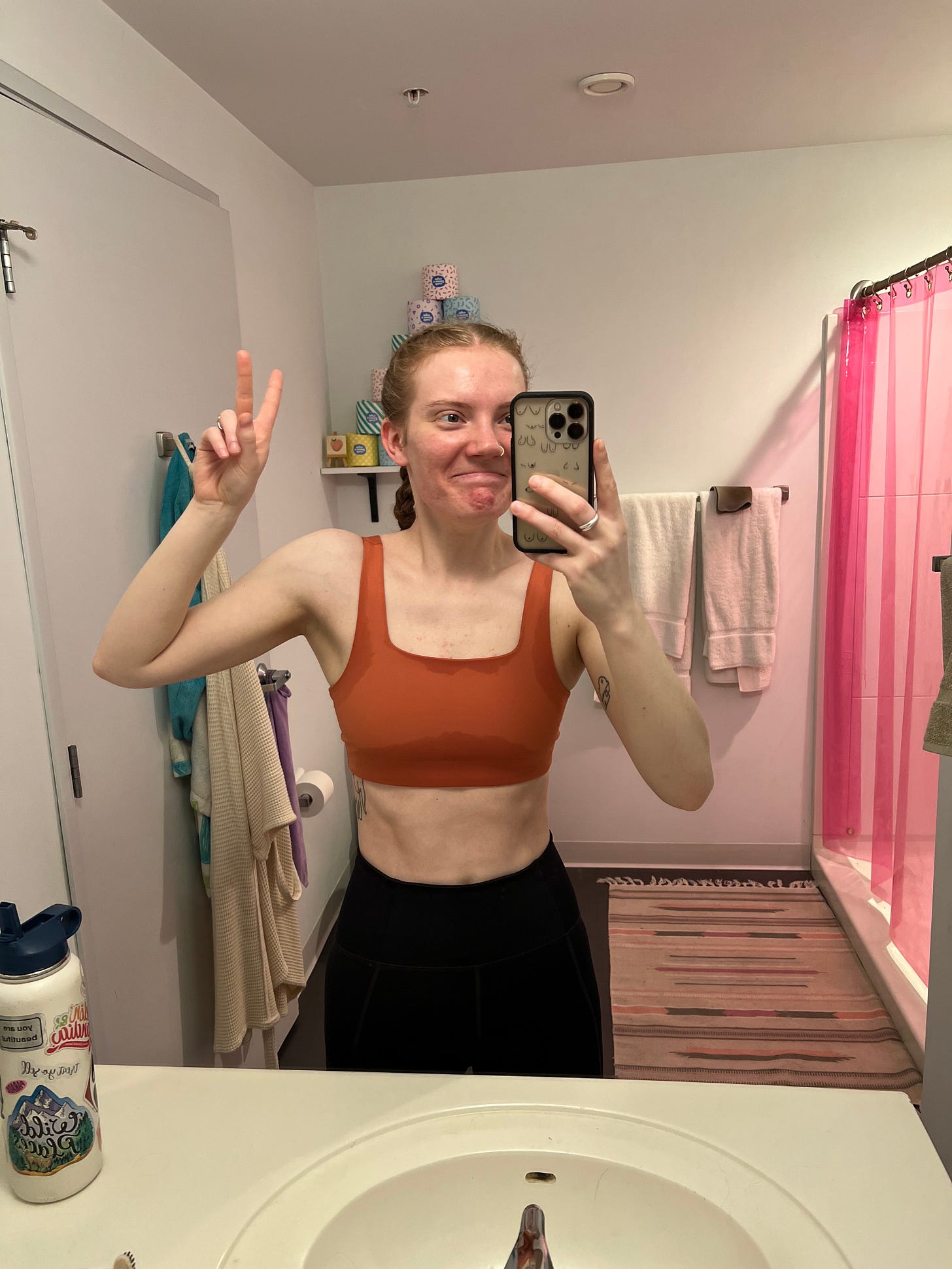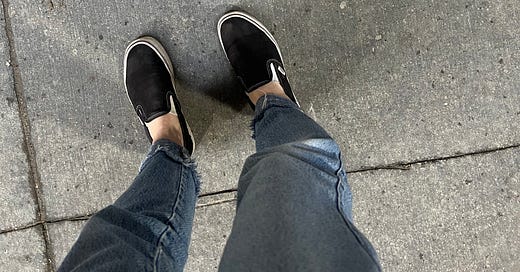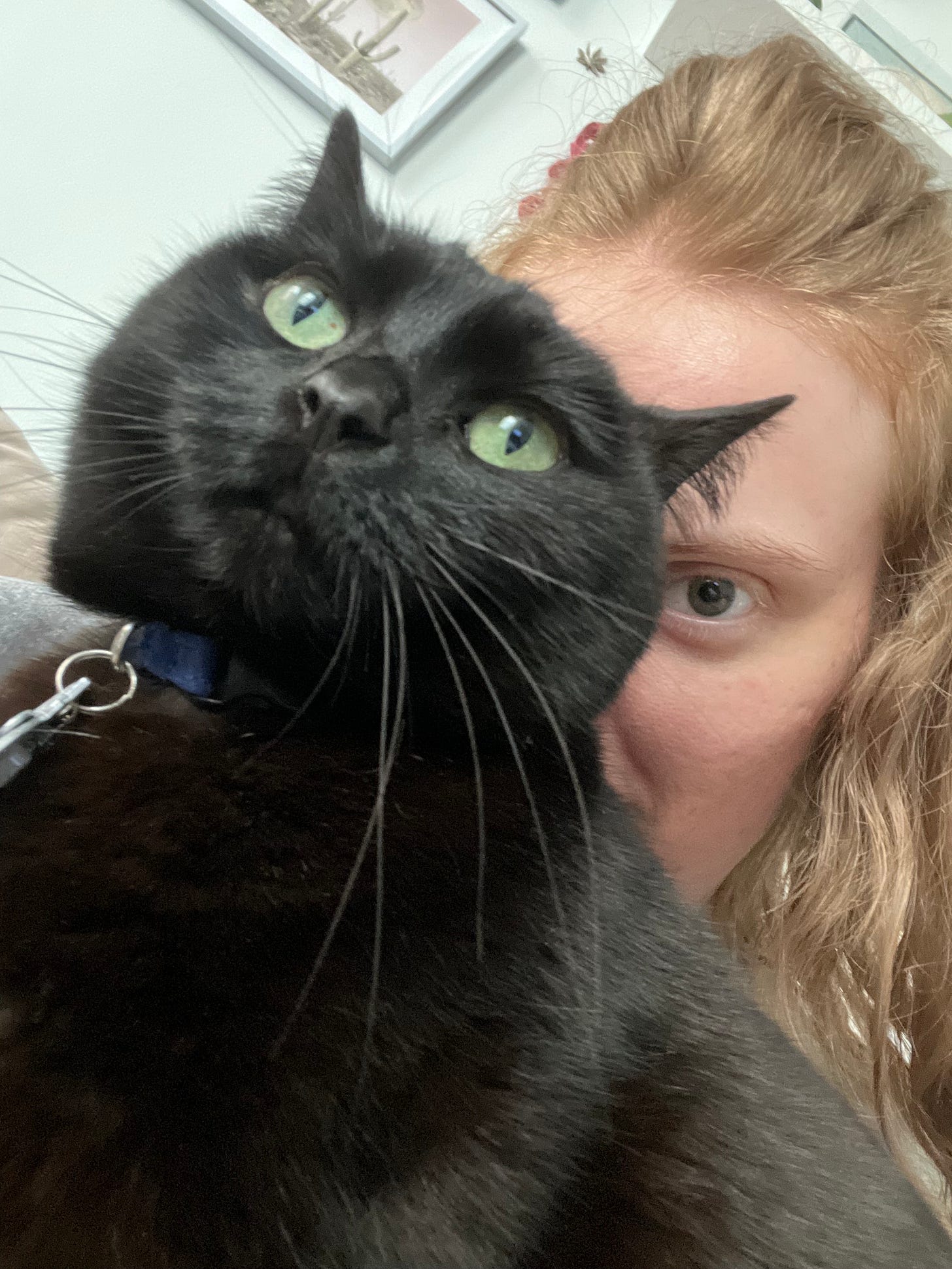Back in January, Chris and I started casually trying to buy a house. For anyone wondering, the process of ‘casually’ trying to buy a house looks something like this: tour a bunch of homes and put in a few offers for tens of thousands of dollars over asking price, get denied repeatedly but do not ever be too devastated about it because the house wasn’t perfect anyway (though you doubt anything will be) and you still don’t have to move out of your current apartment for several months, gradually start to lose hope, then find a friend of a friend (or in this case, friend of a brother-in-law) who is selling their house when their tenant (aforementioned brother-in-law) moves out (which happens to be right around the same time your lease expires), meet in a coffee shop but not before asking another stranger if she’s the one you’re looking for and inadvertently stealing her table when she mishears you and starts packing up her things so you can sit down, a fact which you don’t realize until she’s walking away.
And, so, yeah, we have an accepted offer on a house and I hope it’s not too soon to talk about this but we should be buying a real live building in which to conduct our real-life living in a matter of months.
Looking for a house requires trying to do the impossible: look into the future. I’ve never moved into an apartment planning on staying more than a year and a half, and now suddenly, I’m expected to know what I’ll want in my life and in a home in five to ten years. A home is more than a building, it’s a place to conduct our lives, so in order to try to pick out a house that would allow us to conduct our lives in the way we want to, we have to try to predict how we will want to conduct our lives while living there.
I suppose the key items on my wishlist from when I was 20 are not so different from what I want now: a garbage disposal, a garage, air conditioning, a dishwasher. Over the years, I’ve added a laundry list of nice-to-haves: a patio in the backyard where I can sip cocktails in the summer sun, arched doorways and built-in bookshelves, a bathroom with tiles older than my grandparents, and in better shape too. None are requirements, but all are important things to consider.
And, of course, the most daunting consideration of all: deciding where the house should be. I’ve recently made the humiliating discovery that I actually crave the suburban life I knew throughout my childhood, but I don’t think I’m quite ready to forfeit my illusions of myself as a hip, young city dweller just yet, even if the idea of homeownership does make me feel like I should be shuttling all 2.5 kids off to church and fixing a pot roast while wearing an apron.
As a kid, when the idea of what home was and should feel like was still being formed in my mind, I didn’t have to choose where that home would be. Decisions like this were made for me; my family and I lived where we lived because that was simply where we lived. I didn’t have to concern myself with finding the money it took to buy the house or exploring the neighborhood or researching the school district or mapping my mom’s commute. My family moved when I was eight to the house I would finish growing up in, and the most work I had to do was ride along to house showings and give my opinions on the carpet that would undoubtedly be removed if we bought the house anyway.
My mom started driving a Hyundai Elantra sometime around my seventh birthday. To me, this was just a fact of life, the same as the fact that I woke up in the morning and got ready for school. These were just the things I knew. New things entered my life without me ever having to give them much thought. I didn’t have to consider my mom’s trip to the car dealership, wonder how she had chosen the model and color of her car, or compare the features of her new car to any other cars on the market. All I knew was that I no longer had to physically roll down the windows; a button did that now. And that was enough for me.
Choices during childhood are often limited to what shirt to wear and which cereal to pour for breakfast. I don’t know if I was exceptionally under-prepared for or incredibly disinterested in the burden adulthood would prove to be, but I never anticipated I would have to make as many choices as I do, or that I would feel so blindsided by every single one of them. Everything seems to require a decision these days. I have to choose where to live, I have to choose what to eat for dinner, I have to choose what job I want to do and which business I want to do it for, I have to choose which type of pet to adopt and which kind of car to drive and when to buy a new car and the list goes on and on. Once I’ve chosen what, I must choose when and how, which are often harder than choosing what. More times than not, several more decisions spur from each of the others.
The hardest part of choosing where to live is trying to predict where will eventually start to feel like home. None of the places we shopped for houses felt like home at first, and we are both certain we do not want to live in the one town that does already feel like home. The places I’ve previously called home have felt like home because I was told that they were; I grew up believing that those places were home and the way I felt in them was what home should feel like. Every home I’ve chosen for myself hasn’t quite felt the same, I think because I was the one that decided where to live.
I think I always decided that wherever I lived on my own couldn’t be home for one reason or another. One apartment was too close to my family, one too far away, one was in an area I hated, one in an area I loved but felt no right to claim as my own. When I get to pick where home is, I am able to see all the reasons it shouldn’t be called home, because I’m constantly comparing to what I think home should be, because of what I was told home was.
Home as a feeling, rather than a place, seems to equate only to childhood in my mind. The familiarity that only comes with growing up alongside the trees, the sense of ownership that comes with simply knowing nothing else, the lack of responsibility to keep the house livable, but the freedom to personalize however seems right in the moment, that is what home is to me. By this standard, even the home that was mine in childhood is gone.
The structure still stands, of course, but the trees I grew up alongside have lost battles to emerald ash borers. The ownership I felt over the neighborhood has been passed onto the new generation of hooligans stomping through the easements between the neighbors’ houses. The new generation will learn about the water lady and her antics, they’ll learn how to tell the difference between north and south depending on which side of the street they stand on, they’ll learn which neighbors to nod to and which ones to avoid. The new generations won’t have memories of the old wooden playground like I do, they won’t know to avoid biking past the two tiny white dogs (they’re afraid of the wheels), they won’t remember the time the bus driver drove past every kid on our street without stopping, but that only further proves that the new generation owns the neighborhood I thought was my own, while I own just a memory of it. It’s no longer my home, my concept of home has been lost to time.
The house I grew up in stopped feeling like home shortly after I moved into my first apartment on my own. In a matter of weeks, I realized I had outgrown the purple bedroom that previously housed the dreams, ambitions, and secrets of my youth. My snacks no longer lived in the kitchen cabinets, my skincare products were nowhere to be found in the bathroom closet. Everyone left in the house started to ooze into the spaces I used to occupy; my absence was hardly noticeable unless you knew exactly where to look.
When I would visit, I noticed the signs that things had been tidied in anticipation of my arrival — clean dishes dripping in the drying rack, a broom left out here or a dusting rag left there, no doubt discarded by my sister who had given up cleaning in favor of reading one more page. Disagreements that used to happen in front of me were paused and continued later, after I had left for my new abode, when the company was gone. At first, it felt as though new walls were being erected throughout my house, but eventually, I realized that I was just seeing the same walls, from the outside rather than the inside. My home was no longer my home, it instead belonged solely to the three people left living there.
I always took the idea of home for granted — it was a place I didn’t have to think about. It didn’t matter if I wanted that place to be my home or not, it just was. I grew around it and it grew with me. I’ll likely never be mindlessly guided into a new home, since I unwittingly made it to the point in life where it’s sort of universally agreed I’m allowed and even expected to make my own decisions. And so now, after making all the decisions one must make when choosing their own place to call home, I’m left with nothing to do but figure out what home means and make the place I’ve chosen into one.
take me 2 ur leader
my home is the future
where I feel most at ease
most like myself
when I’m who I want to be
without the burden of who I am
run away, train
you can love it at your own risk
here will not love you back
keep loving, keep leaving
here for the next there
thinking that it’ll work
this time will be the answer
bleaker beaker
nothing is ending up
as I thought it would
what I thought was stable has dissolved
what I thought would be melt
has lasted
I’m more steady and unsure
more afraid and less challenged
the air outside smells like clementine
half is all I’ll ever have


I don’t really know how to segue this nicely, but I did actually want to stop talking about myself and talk about something serious for a moment. Someone that I graduated high school with passed away earlier this week. We weren’t close — in fact, I kind of relentlessly bullied them in the third grade. I didn’t understand it then, but I later realized that it was because they came into our classroom halfway through the year knowing exactly who they were, when I had been the new kid in the same room months before and felt as though I had to completely transform myself into a new person to be accepted. I wanted to link an important piece they wrote in the fall of 2020 that I found while searching for an obituary because I think it illustrates just how willing we are to pretend that Wisconsin is a moral high ground and our midwestern politeness prevents bad things from happening here. If you don’t usually click links I put here, I would recommend clicking that one at least.
Aside from that, I hope you have a wonderful weekend. Maybe take an extra moment to look around where you live and see if you can make it feel a little more like home. Or maybe reconsider what home means to you.










The old wooden playground :,)
excited for the stairs soon to be in your home :)